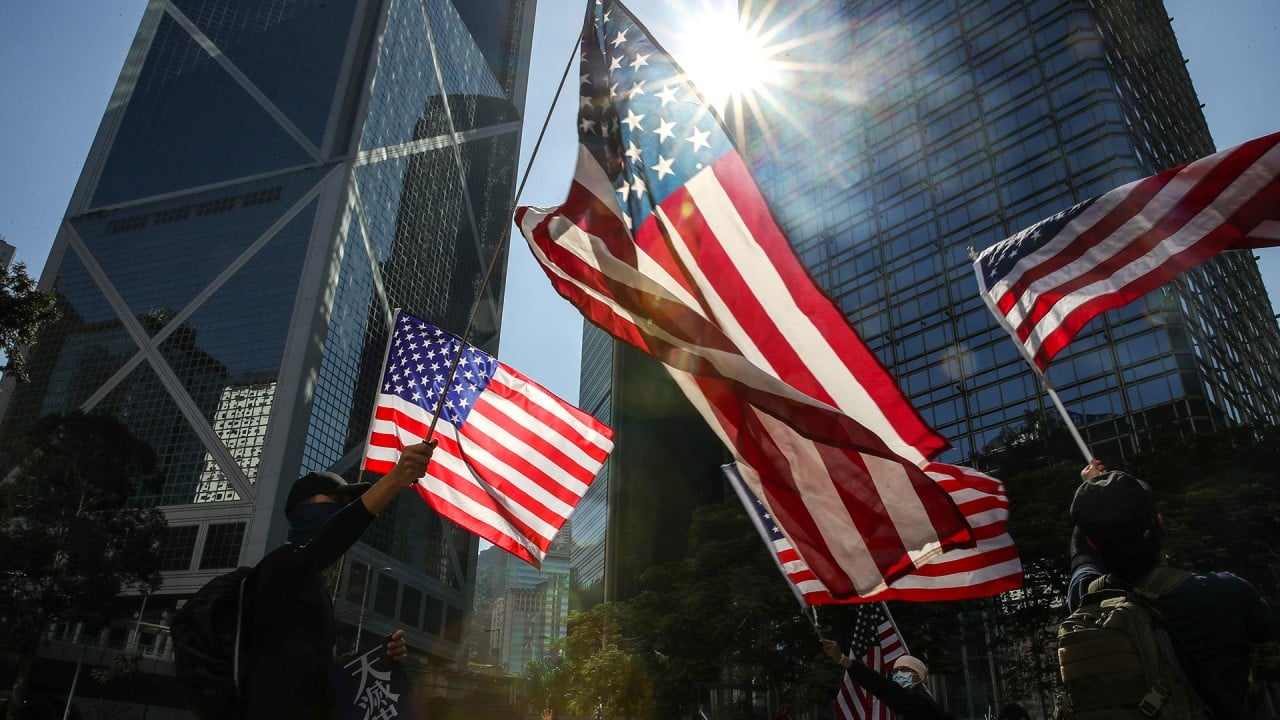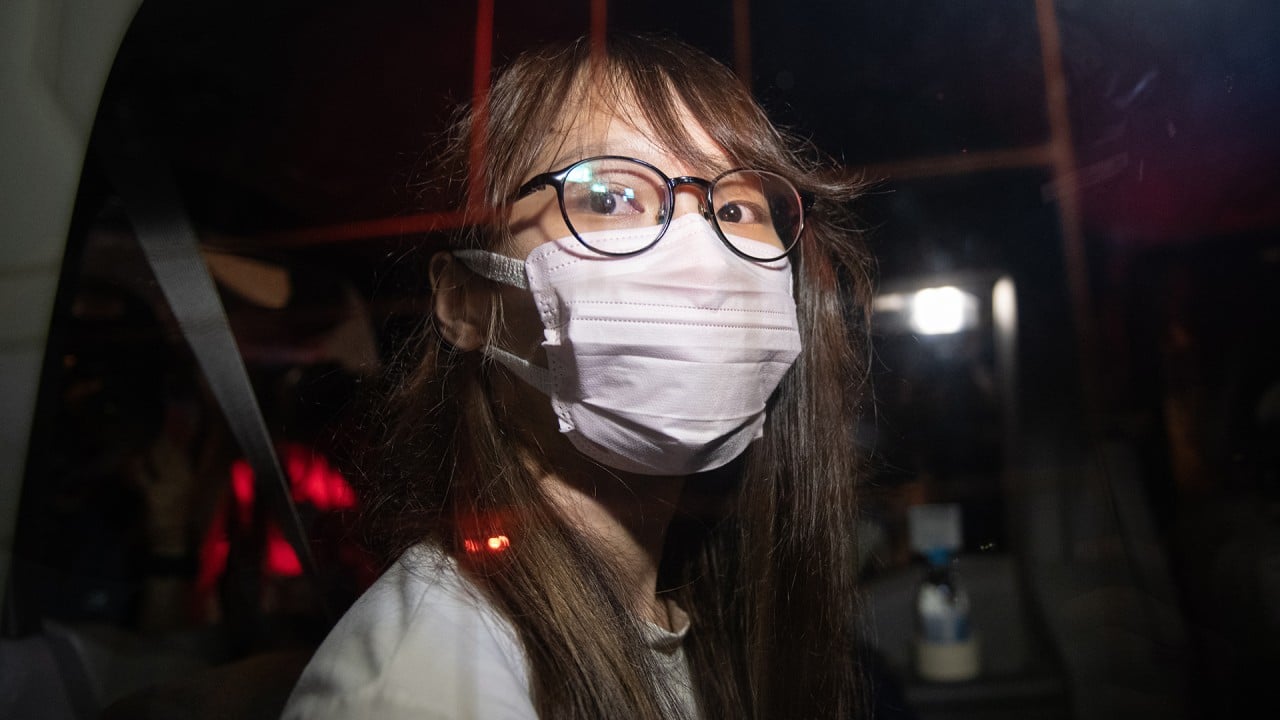
National security law: Hong Kong’s US exports to be relabelled ‘Made in China’
- Notice in US government register says Hong Kong goods for export to US must be relabelled ‘Made in China’
- This means goods made in Hong Kong will be subject to trade war tariffs previously levied only on mainland Chinese companies
Goods made in Hong Kong for export to the United States will have to be labelled “Made in China” after September 25, according to a US government notice.
A notice will be published on the US Federal Register on August 11, stipulating that “45 days after the date of publication”, goods “must be marked to indicate that their origin is ‘China’”. The move is “due to the determination that Hong Kong is no longer sufficiently autonomous to justify differential treatment in relation to China”.
The Hong Kong government said in a statement on Tuesday evening that it was mulling filing a claim at the World Trade Organisation (WTO), of which it is a separate member, accusing the US of sowing “confusion and harming the interests of all parties, including the United States itself”.
The statement said the US move to reclassify Hong Kong’s exports “reflected the US’ disregard for Hong Kong’s status as a separate member of the WTO”, adding that the ruling “may not comply with WTO regulations”.
“If necessary, Hong Kong Special Administrative Region will not rule out taking actions in accordance with WTO rules to safeguard Hong Kong’s interests.”
Hong Kong has a higher trade deficit with the US than with any other economy, though this dropped by 16 per cent last year to US$26 billion. From January to May this year, Hong Kong’s exports to the US fell by 22.3 per cent in volume from a year earlier.
Hong Kong is much more significant as a re-export hub than a direct trading hub in its own right. Its economy is a much different beast than in the 1970s and ’80s, when it was a manufacturing stronghold. Now, only 1 per cent of goods shipped from Hong Kong are made in the city, which instead serves as a logistical gateway to mainland China for both goods made there and going there.
Domestic exports to the US in 2019 were US$471 million, or 0.1 per cent of total outbound shipments including re-exports, data from the city’s Trade and Development Council shows.
Within this, 48.5 per cent of Hong Kong’s home-made exports to the US in value terms over the first half of the year were jewellery items. The second most valuable sector was edible products, accounting for 10.7 per cent of domestic outbound shipments.

06:21
Hong Kong and the US: how much do they rely on each other economically?
Under the current tariff regime, jewellery is subjected to a 7.5 per cent tariff when exported to the US from China – a duty that was halved from 15 per cent with the January signing of the phase one trade deal.
John Marrett, lead analyst for Hong Kong at the Economist Intelligence Unit, said that “in the grand scheme of things, this obviously is not good, but it does not mean that much because overall the value is marginal”.
This change also raises concerns that goods produced or substantially transformed in Hong Kong will be treated as having originated in China
“This change also raises concerns that goods produced or substantially transformed in Hong Kong will be treated as having originated in China for purposes of the Section 301 tariffs the US currently levies against products of China,” wrote trade law specialists Sandler, Travis & Rosenberg in a note on Tuesday.
At the moment, there are US tariffs applied exclusively to US$550 billion worth of Chinese goods. The addition of Hong Kong-made goods would expand this, albeit not significantly.
Analysts have said that the more significant among the flurry of US trade actions against Hong Kong in recent weeks has been the rolling out of export controls, which means importers in the city cannot access certain sensitive American technology. This could hamper university research and even access to consumer technology, analysts and industry figures have warned.
Arthur Lee Kam-hung is the CEO of Hong Kong X’tals, a manufacturer of hi-tech components used in 5G base stations and autonomous vehicles. His firm sells some products out of Hong Kong, but he said the new rules will not affect him much, since the company has already distanced itself from an “outdated” and “volatile” American market.
“For our traditional [quartz crystal] components that are manufactured on the mainland, the US' 25 per cent tariffs [already] applied to our products [and] were borne by our customers in the US. But the US market is very small for our business as we are focusing on Chinese and European clients,” he said.
Lee added that the trade war made him diversify some material sourcing away from the US, but that Trump's policies and sanctions make him “very worried” about dealing with the US. “We will hold off on any investment or sourcing on the US market,” he said.

01:58
Hong Kong opposition activist Agnes Chow swept up in Hong Kong arrests under security law
The company had already planned to introduce some backup production facilities to its Hong Kong operations to counter the risk of a major coronavirus disruption to the city.
“These plans are unlikely to change, no matter if the US applies new tariffs and changes the ‘Made in Hong Kong’ label to a ‘Made in China’ or not,” Lee said.
The Chinese Manufacturers’ Association of Hong Kong (CMA) said that the US customs authority’s move would prove costly and “inconvenient” to Hong Kong exporters, who will have to pay for new packaging and certificates of origin.
“This series of so-called sanctions on Hong Kong, by the US, is unreasonable and ignores the basic principles of international trade and economics,” the CMA statement said.
Additional reporting by Karen Yeung

